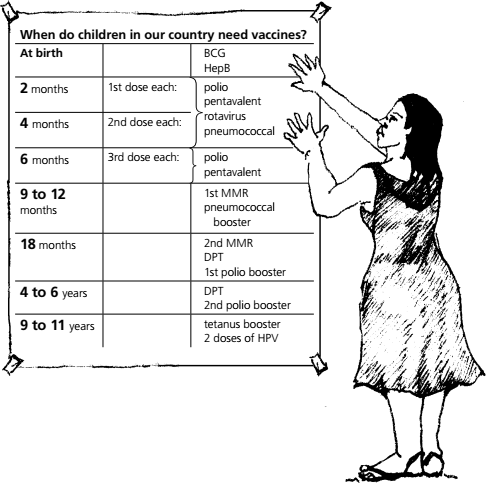Hesperian Health Guides
Who Needs Vaccinations and When?
HealthWiki > New Where There Is No Doctor > Vaccines Prevent Illness > Who Needs Vaccinations and When?
- Some vaccines are given to almost everyone—infants, children, and adults. Older children or adults who missed vaccinations given to infants may still get them later.
- Some vaccines are useful only in certain regions and are given only to people who live or visit there.
- Some vaccines are not needed for everyone but are recommended for certain groups, such as women who are pregnant, health workers, or older people.
- When a disease is new, or new to a region, usually everyone will need the vaccine. When an illness, such as cholera,suddenly affects everyone in the same region, itis called an epidemic. If there is already a vaccine, giving it to everyone quickly can stop an epidemic. A pandemic is when an illness affects the whole world at once. COVID-19 came as a pandemic and it was a new disease, with no vaccine at first. Fortunately, several new vaccines to prevent COVID-19 were made within a year.

Contents
Routine vaccinations protect babies and children
Health workers give babies several check-ups during their first year of life. This is also when they give most vaccinations. Which ones and when each is given will depend on the health recommendations in your country.

To keep babies and children healthy, vaccinations are very important but so are the living conditions that prevent disease. Safe drinking water, good sanitation, breastfeeding for at least the first 6 months of life, and good nutrition will prevent much illness. (See the chapters Water and Sanitation: Keys to Staying Healthy and Good Food Makes Good Health.)
Childhood vaccines and vaccine boosters are given to adults when another dose of vaccine is needed beyond childhood for the protection to last or because they did not receive all their vaccinations as children.
Health authorities in each country recommend a schedule for vaccinating babies and children. It shows which vaccinations are given together and at what age. When 2 vaccines cannot be given together, it is often because they do not work as well when they are put in the body at the same time.

Vaccines and HIV
In general, babies and adults with HIV need the same vaccinations as other people. In some cases, a child or adult with HIV may need an extra dose, as with the measles vaccine.
For a few vaccines (BCG, MMR, OPV), make sure health is stable and get HIV treatment medicines started before vaccination. HIV treatment makes the body’s immune system stronger and this makes the vaccinations work even better.
For the BCG vaccine, it is safe to give at birth even if the mother has HIV. However, if the child is older and has HIV, treat the HIV first.

Vaccines and pregnancy
Vaccines protect the health of the mother and the developing baby. Also, the pregnant woman passes antibodies from vaccines to her unborn child that help protect the baby after birth. Newborns are too young for some vaccines in their first weeks or months of life.
Share this information with parents of girls and with women who are pregnant:
- Vaccinations do not affect a girl or a women’s ability to become pregnant.
- Most vaccines are safe to get during pregnancy.
- When girls receive all their vaccinations as children, fewer vaccines are needed during pregnancy. The rubella (German measles) vaccine is a good example of a vaccine where it is helpful to give to children or young women before pregnancy because rubella in a pregnant mother is dangerous for a baby.
- Everyone needs the tetanus vaccine repeated over the years, either as a single vaccine or as a part of a combination vaccine. If a woman has not had a vaccine against tetanus recently, she will need at least one during pregnancy. The vaccine prevents dangerous tetanus infection in a newborn caused by an unsterile tool or unsterile umbilical cord wrapping used during childbirth.
- In your country, health workers may recommend other vaccines during pregnancy, such as whooping cough or flu vaccines.

Some vaccinations are avoided during pregnancy such as BCG or measles vaccines. When giving vaccinations, ask a woman first if she might be pregnant.
Keep a record
Ask for and keep any immunization cards or documents that show the name and date of vaccinations. Children often need these records to enroll in school and adults need them for work, travel, and to show health workers the vaccinations they have already received and those they still need. If they don’t have the cards at your clinic, keep a record yourself and have the person who gave the vaccination fill out the information and sign it. The clinic providing the vaccines will also keep records on which vaccines have been given and those needed at the next visit.


